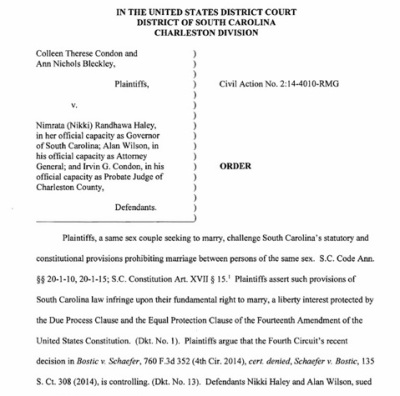Different state, same result: Federal judge invalidates state vote on marriage

COLUMBIA, S.C. – Judge Richard Mark Gergel, sitting on the U.S. District Court for South Carolina, ruled Nov. 12, the state of South Carolina does not have a compelling interest or a right to ban same-sex marriages.
"State laws that run contrary to constitutionally protected rights of individuals cannot be allowed to stand," Gergel wrote in his 26-page decision, striking down the state's laws that banned same-sex unions.
Palmetto State voters overwhelmingly approved a 2006 referendum making marriage between one man and one woman the "only lawful domestic union" in the state, with more than 78 percent of the vote for the constitutional amendment.

Gergel said "in addressing plaintiffs' constitutional claim to a fundamental right to marry, this court does not write on a blank canvas," referencing the Supreme Court's 2013 decision on the federal Defense of Marriage Act (DOMA) in United States v. Windsor.
He issued a stay on his ruling until Nov. 20.
The U.S. Supreme Court 5-4 vote which struck down DOMA, last June, has been used by federal judges to effectively implement same-sex marriage by court fiat.
However, the Sixth Circuit Court of Appeals used that same decision to uphold marriage as between a man and woman in the states of Tennessee, Kentucky, Michigan and Ohio.
Writing the majority opinion for a three-judge panel, Jeffrey R. Sutton said the Supreme Court answered only a narrow question of whether the federal law was an "unprecedented intrusion into the States' authority over domestic relations" and the decision did not address the validity of state marriage laws.
He also rejected the notion that courts should be resolving these issues instead of voters.
"When the courts do not let the people resolve new social issues like this one, they perpetuate the idea that the heroes in these change events are judges and lawyers," he wrote.
"Better in this instance, we think, to allow change through the customary political processes, in which the people, gay and straight alike, become the heroes of their own stories," he said, "by meeting each other not as adversaries in a court system but as fellow citizens seeking to resolve a new social issue in a fair-minded way."
In his opinion for the District Court of South Carolina, Gergel said the decision in a Virginia case, Bostic v. Schaefer, was a "controlling precedent given that the U.S. Supreme Court did not overrule it."
In citing Bostic, a suit filed in July 2013 in which Virginia's ban on same-sex marriages was overturned, the judge was signaling that case was strong enough to build on. The Fourth Circuit Court of Appeals upheld the lower court's ruling for a redefinition of marriage in Bostic and in October the U.S. Supreme Court denied a writ of certiorari, declining to hear the case and thereby allowing to stand, vacating Virginia's ban on same-sex marriage.
Same-sex marriage is now legal in 33 states, and in 11 more the courts have paved a path for homosexuals to marry but are awaiting pending legal action.
The pattern continues to follow the shaping of federal courts by President Obama in filling vacancies with his appointees.
RELATED ARTICLES:
6th Circuit: 32 million citizens of Ky, Mich, Ohio & Tenn have authority on marriage, not judges